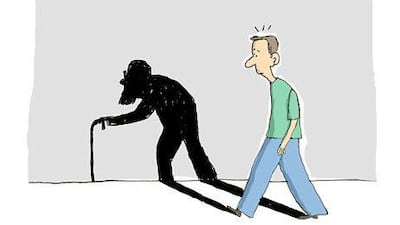Did you know that the part of the brain that lights up when we think about our future self (ie, an older us) is the part that relates to other people? This is major news. Little wonder then that we don't eat as healthily as we should, exercise enough or save what's actually required to meet our future needs when we retire. After all, that future "us" isn't really us, it's someone else.
And so the battle between present self and future self ensues. The thing is that it's a pretty unequal battle; after all, there's no one to stick up for future self, and by giving in to constant temptation and the desire to spend and enjoy life now means that present self can trample all over the dreams of future self. Present self wants to consume and doesn't recognise future self, while future self is upset and wants present self to save.
The thing is that tomorrow does come, like clockwork, and there are very real consequences to be borne not only by the person who doesn't save, but also by all who love or are affected by him or her.
According to a recent HSBC survey that questioned more than 15,000 people across 15 countries, including the UAE, 48 per of those questioned have never saved towards their retirement. I believe the reality out there is, and will increasingly become, worse as global economic problems continue to play out.
One seemingly eternal quest is figuring out how much is "enough" to retire on. When asked, people on average said they would need 78 per cent of their current income once they enter retirement to sustain a comfortable lifestyle; going by current data, this seems far from realistic.
Let's get a feel for how much money we're talking about. People expect retirement, on average, to last about 18 years. If you do a quick back-of-the-envelope calculation, would you be able to sustain yourself for 18 years on the global average of US$34,380 - ie, if you have about half a million dollars set aside? It's most likely that your savings behaviour - what you're doing (or not) to save for later on in life - falls way below this, or what you would like for yourself during retirement.
You have to ask yourself if you want an active life of exploration and discovery, or one of subsistence and getting by.
Now transport yourself across time, look in the mirror and talk to, or even better, be your future self. Is this how you want to live? Not able to afford things later in life? I bet my bottom dollar that the answer is no. So how can we change our relationship with our future self so that we are more mindful of today's habits and how they affect our life later on.
This is the big issue: changing habits, and sticking to goals.
One way of doing this is through opt-in schemes, where the benefit of changing our behaviour is explained - this is called "enhanced active choice".
This is a real example: participants were told: "We would like you to imagine that you are interested in protecting your health. Your employer tells you about a hypothetical programme that recommends you get a flu shot this autumn and possibly save $50 off your bi-weekly or monthly health insurance contribution cost". The three choice structures were tested (and the results) were then:
(Opt-in) "Place a check in the box if you will get a flu shot": 42 per cent ticked the box
(Active choice) "Place a check in one box: I will get a flu shot or, I will not get a flu shot": 62 per cent ticked the box for a flu shot
(Enhanced Active Choice) "Place a check in one box: I will get a flu shot to reduce my risk of getting the flu and I want to save $50; or, I will not get a flu shot even if it means I may increase my risk of getting the flu and I don't want to save $50": 75 per cent ticked the box for a flu shot.
And so, extrapolating from this, place a tick in one box: I will save money every month towards my retirement so I can live a decent, independent life, and not like a pauper or have to ask for help.
Or:
I will not save for my retirement, even if this means that I will increase the risk of being dependent on others later in life and not have much option or control over where and how I live.
It's not good enough to be reminded of what you will lose if you don't follow through with action.
Your present action is directly connected to your future life.
Which box will you tick?
Nima Abu Wardeh is the founder of the personal finance website www.cashy.me. You can contact her at nima@cashy.me

Prudence in the present makes for a rosier future
On the money: In a recent survey, 48 per cent of those questioned said they have never saved towards their retirement. I believe the reality out there is, and will increasingly become, worse as global economic problems continue to play out.
Most popular today
